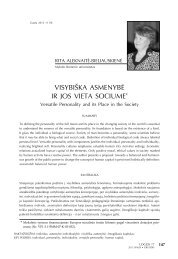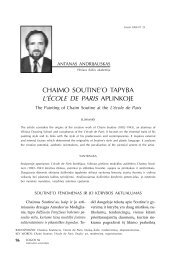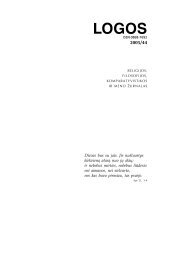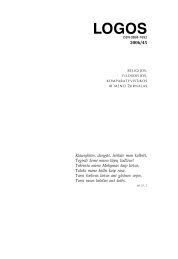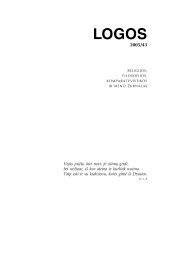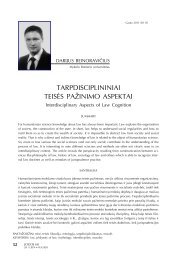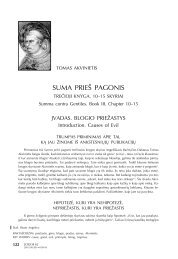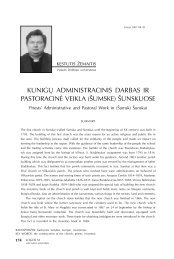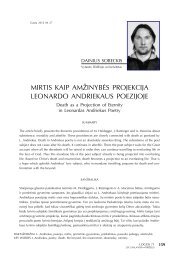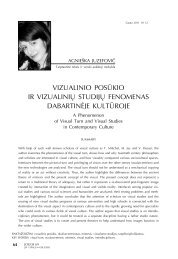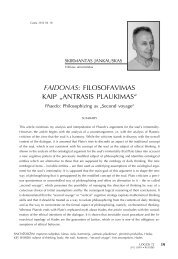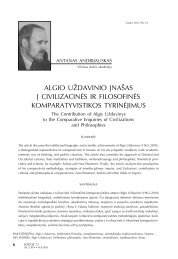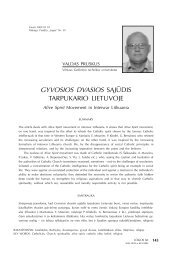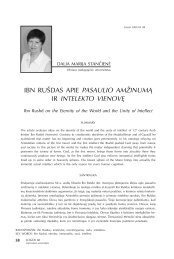Bet kvailas žmogus įgis supratimą, Kai laukinė a - Logos
Bet kvailas žmogus įgis supratimą, Kai laukinė a - Logos
Bet kvailas žmogus įgis supratimą, Kai laukinė a - Logos
Create successful ePaper yourself
Turn your PDF publications into a flip-book with our unique Google optimized e-Paper software.
Gauta 2005-04-20<br />
MOKSLINË MINTIS<br />
PIRMASIS LOGIKOS AMÞIUS LIETUVOJE:<br />
ONTINIS UNIVERSALIJØ PROBLEMOS<br />
LYGMUO<br />
The First Age of Logic in Lithuania: The Ontological<br />
Level of the Problem of Universals<br />
SUMMARY<br />
The interpretation of the ontological level of the problem of universals, involved in logic in Lithuania<br />
in the sixteenth century, cannot be strictly ascribed to any of the classical variants of realism and nominalism.<br />
Such an interpretation, similar to that of Francisco Suarez, would rather be regarded as an intermediate<br />
model between moderate realism and conceptualism. Like the moderate realists, the representatives<br />
of the above mentioned logic (M. Úmiglecki, P. Viana and D. Ortiz) maintained that universals<br />
are given in the very nature of individual things. But, contrary to moderate realism, Lithuanian<br />
scholiasts refused to acknowledge the real existence of universals. In their opinion, universal nature<br />
exists in the multitude of individuals just as much as it is cognised by the human intellect. On the<br />
other hand, together with the conceptualists, the scholiasts of Vilnius affirmed the existence of universals<br />
in the human intellect. But, unlike conceptualism, these authors, with the exception of Viana alone,<br />
did not attribute the status of the universal to a common concept of particular things. The universal<br />
was regarded as the very nature of real things, which our intellect abstracts from particularising conditions<br />
and cognises beyond the frame of individuality. Meanwhile, the common concept was treated as<br />
a representation of the universal, created by the human intellect.<br />
Logikos mokslo Lietuvoje atsiradimas<br />
sietinas su aukðtojo mokslo pradþia.<br />
VYTIS VALATKA<br />
Mykolo Romerio universitetas<br />
ÁVADAS<br />
Ið esmës jis susijæs su scholastinës filosofijos<br />
dëstymu, o pirmoji ðios filosofijos<br />
RAKTAÞODÞIAI. Universalija, nuosaikus realizmas, konceptualizmas, objektyvi bûtis intelekte.<br />
KEY WORDS. Universal, moderate realism, conceptualism, objective being in intellect.<br />
LOGOS 42<br />
2005 BALANDIS • BIRÞELIS<br />
25



